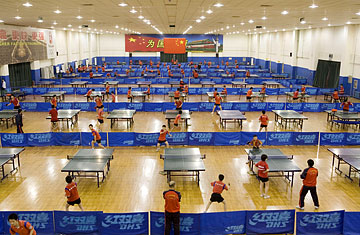
China is one of the few countries in the world with academies dedicated to what many consider a rec-room pastime—like the Luneng Table-Tennis School, with 80 tables
(2 of 3)
The Cost of Gold
if it weren't for the Beijing Olympics, China's sports system might have become liberalized the way the rest of Chinese society has. For more than two decades, the People's Republic boycotted the Olympic movement to protest rival Taiwan's participation. When China finally rejoined the Games in 1980, the sports-school system was expanded to ensure that Chinese athletes would do their country proud. For many parents, securing three bowls of rice a day for their offspring was enough to convince them that the grueling training was worth it. But by the '90s, with the economy opening up, fewer families were willing, say, to send their daughters to train as weight lifters when they could study computer science instead. After all, for every Olympic champion the sports academies produce, hundreds of thousands of other children fail. Most of these kids miss out on the education provided in regular schools. The China Sports Daily estimates that about 80% of the country's retired athletes are plagued by unemployment, poverty or chronic health problems resulting from overtraining.
But with Beijing 2008, the sports system has gone into overdrive. After 2001, the annual budget for the Sports Ministry increased to $714 million, from $428 million the year before. "With the Olympics in Beijing, we want to make sure we do very well," says Hao Qiang, head of the Sports Ministry's competition-and-training department. "Otherwise, the public will be very disappointed that we did not display proper national spirit." It's a pricey endeavor: each of China's gold medals will cost the state upwards of $7 million, according to Bao Mingxiao, director of the Sports Ministry's Institute of Physical Science. At the Qingdao City Sports School, one of the country's top breeding grounds of Olympic athletes, principal Qiao Xiangdong credits Beijing 2008 for spurring the local government to build a new $30 million campus for his 600 students. "Before, some parents were worried about sending their kids to sports schools because they thought their children would have to eat too much bitterness," Qiao says, using the Chinese term for enduring hardship. "But the Beijing Olympics has made people willing to contribute to the nation's glory."
China's athletics achievement is all the more impressive given that it isn't a very sporty nation. I remember jogging in Beijing several years ago only to have people look behind me to see whom I was running away from. But China's leaders have a long tradition of using sports as a spur to national pride. Consider the country's decades-long dominance of table tennis. This supremacy had little to do with a national passion for wooden paddles and plastic balls. China decided to develop star paddlers largely because the International Table Tennis Federation was, in 1953, one of the first sports organizations to drop ties with Taiwan in favor of the mainland. In 1959, Rong Guotuan made history as China's first world champion in any sport. Mao deemed the victory a "spiritual nuclear weapon." Determined to maintain Ping-Pong supremacy, coaches fanned out across the countryside looking for kindergartners with quick reflexes and superior hand-eye coordination. "Other countries have produced some really good table-tennis players," says Liu Fengyan, director of China's table-tennis administrative center. "But without a sports system like China's, their success ends when those athletes retire."
This single-minded drive explains why China has full-time academies dedicated to what most countries consider a rec-room pastime. At the Luneng Table-Tennis School in Shandong province, 230 boarding students crowd a gymnasium set up with 80 Ping-Pong tables. In the morning, children train for about four hours. A few hours of academic classes are held in the afternoon, more than at many other sports schools. Three times a week, students hone their table-tennis skills also in the evening. Many kids see their parents for only a couple of weeks each year. "China's so good at Ping-Pong because we train harder than anyone else," says Xu Mengjie, a pigtailed 10-year-old standing under a giant banner that exhorts FIGHT FOR YOUR COUNTRY. "I always feel like I need to work harder because that's the only way I can become an Olympic champion."
China's table-tennis success inspired the country's sports officials to apply the same model to medal-rich Olympic disciplines. In addition to diving, in which the Chinese won six of an available eight gold medals in Athens, the country is now a powerhouse in weight-lifting and shooting, neither of which was a popular event before the sports bureaucrats got involved. China's first Taekwondo national team was formed in 1995, when officials noticed that few athletes outside South Korea competed in the martial art. Five years later, in Sydney, China won an Olympic gold in the sport. The first canoeing gold, which China won in Athens, arrived within three years of putting serious resources into the sport.